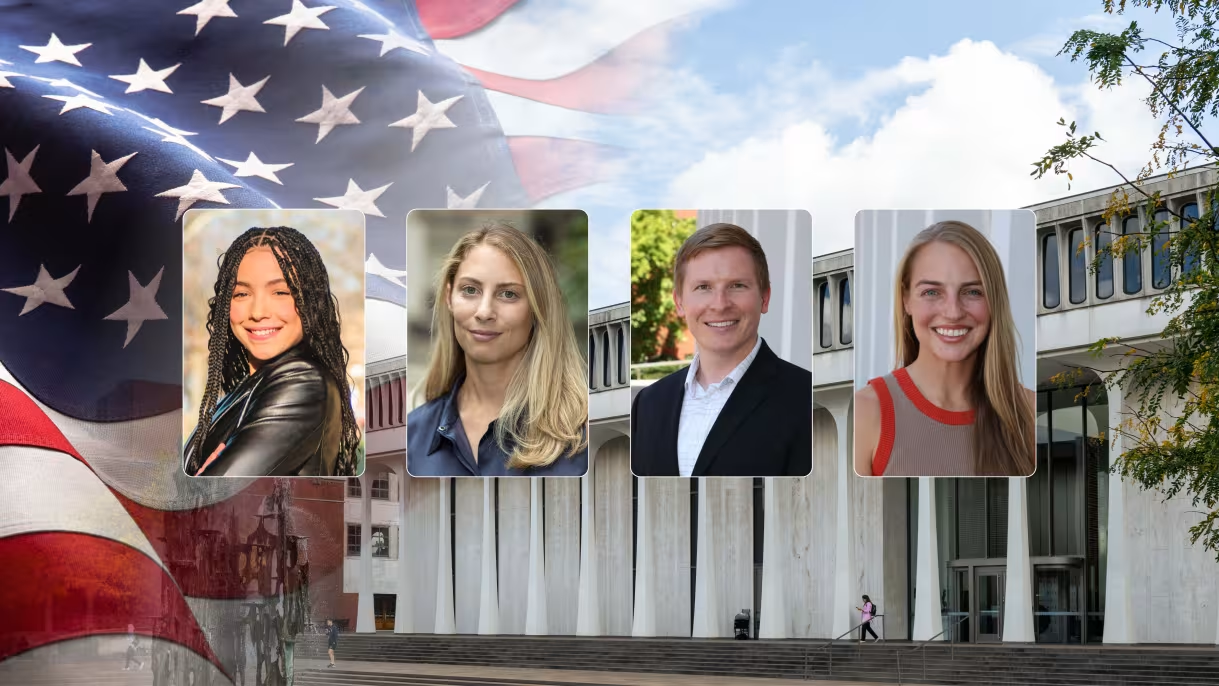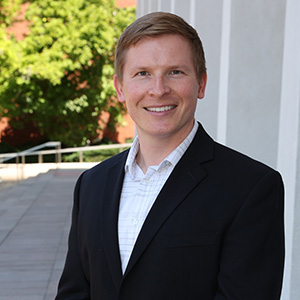

Active Military Students Bring On-the-Ground Perspective to Princeton SPIA Classrooms
The students at the Princeton School of Public and International Affairs bring a range of experiences to the classroom, perhaps none more so than the active military members who attend the School.
Their practical experience often illuminates policy discussions and adds nuance to conversations about the world’s most pressing problems, said Jacob N. Shapiro, a professor of politics and international affairs and director of the Empirical Studies of Conflict project. In turn, the students say their time at School helps them think more broadly about the U.S. military’s challenges and how to tackle them more holistically.
“In most places around the world, the U.S. military is the largest element of the US government in terms of personnel and resources. Having the opportunities for our students to interact with people from across the military improves their understanding of how U.S. policy gets implemented,” Shapiro said. “For the active-duty students, learning from emerging leaders in other policy areas is going to make them more effective as they move into leadership positions where they engage with many different civilian agencies.”
Four Princeton SPIA students who are enrolled in the military shared a bit about themselves and how they expect their time at the School will enhance their careers of service:

Kristy Gonzalez, Class of 2026
Kristy Gonzalez enrolled in the Marine Corps Reserve six months after arriving in the United States from the Dominican Republic. She was attending Miami Dade College at the time, majoring in criminal justice, when she met a recruiter on campus. It felt like an instant fit.
“My dad had passed three years before, and he was in the Dominican Marine Corps. I think some part of that stayed with me, and I was very grateful to be in the country,” said Gonzalez.
Soon after, Gonzalez applied to Princeton after a relative suggested she look at schools aligned with her long-term goals. Gonzalez said Princeton SPIA was appealing because it fits her public-service mission.
“I’m an immigrant and have always been interested in immigration policies, justice, and just a sense of helping the world to work the right way for the right reasons and the right people,” she said, adding, “The military gives you a broad perspective of how the world works and how people make decisions.”
Being at Princeton SPIA has deepened that understanding for Gonzalez, not just in the classrooms but through a memorable taskforce trip to Uruguay, where she had the opportunity to meet with the president and top officials, including the minister of defense. She is excited to meet General Mark Milley, the retired 20th Chairman of the Joint Chiefs of Staff, who is a Charles and Marie Robertson Visiting Professor and Visiting Lecturer at Princeton SPIA.
“I almost fainted when I saw that General Milley was coming to the school,” Gonzalez said. “I never thought that I would email someone who was once the highest-ranking military person in the country.”
Gonzalez has had a variety of experiences since coming to Princeton, including internships with the New York Times Company and Boston Consulting Group. Her senior thesis is on sexual assault prosecutions in the U.S. military, and her ultimate goal is to have a tangible impact on the Department of Defense.
Gonzalez, who is a parachute rigger corporal in the Corps, still commutes to Florida regularly to attend training. Her goal is to become a sergeant before retiring.
“I’ve met a lot of really smart, capable people in the military who, when they hear ‘Princeton,’ think of something so outside their possibilities,” she said. “I try to tell them that this is attainable. They have the resources, ability, and intelligence for it by default.”

Austen Boroff, Ph.D. candidate
When Austen Boroff first joined the U.S. Army, field artillery was not open to women. After commissioning as a Field Artillery Officer from West Point in 2014, she went on to become one of the first female platoon leaders and deployed to Iraq twice.
“It was definitely challenging but also rewarding to be in that cohort, as you’re trying to replicate the leadership style of male officers who were phenomenal, but that style was not authentic for me,” Boroff said.
Later, in Washington State, she commanded the nation’s first long-range hypersonic weapons battery. That experience led her to Princeton SPIA, where she is a General Wayne A. Downing Scholar pursuing a doctorate to deepen her understanding of policy as it relates to military innovation and acquisitions.
Although Boroff came to Princeton SPIA for the policy education, a welcome additional benefit has been the opportunity to learn from other female leaders and absorb new styles of leadership, including from one of her advisors, Janet Vertesi, an associate professor of sociology.
“Being at Princeton in a cohort where women are in the majority has offered invaluable lessons in collaborative and engaged leadership,” she said. “The university provides an unparalleled opportunity to engage with a diverse and dynamic community of professionals.”
Boroff has also valued the opportunities to interact with students and faculty. She and another military student participated in an independent study with Christopher F. Chyba, a Dwight D. Eisenhower Professor in International Affairs and a professor of astrophysical sciences.
“We’ve had the privilege of interaction and mentorship from an expert in the field of emerging technologies and strategic stability,” she said. “That kind of access and support is extraordinary.”
Boroff, a Chatham native, has also enjoyed visiting her parents on Sundays while in New Jersey. She will move to Fort Leavenworth, Kansas, in summer, where she will receive training as a newly minted major and work on her dissertation.
“Princeton SPIA has widened my aperture,” she said. “My experiences in the military were very tactically and operationally focused. It’s insightful to step back and examine the grand strategic picture and tools of statecraft beyond military applications.”

Joshua Peters, MPP '25
Joshua Peters was 14 when he was adopted by an American family from an orphanage in Latvia. Together, they went on mission trips to orphanages and underprivileged communities in Europe.
“Out of that gracious act, a heart of service was born in me,” Peters said. “They demonstrated what it is to be a family, what it means to serve.”
While at Florida State University, Peters enrolled in the Reserve Officers' Training Corps (ROTC). He became an infantry officer and deployed to Europe several times before transitioning to the U.S. Army Special Forces. Most recently, he served as a foreign area officer in the U.S. Embassy in Kazakhstan.
It was that last experience that led Peters to Princeton SPIA. He observed military diplomats advising the National Security Council and sought to learn the kind of analysis and critical thinking they were applying. He had a choice of programs to attend, and settled on Princeton after speaking with alumni and learning about the School’s small cohorts and policy focus.
The most valuable part of the experience so far has been the connections he has made with his Master in Public Policy (MPP) peers. That began in summer, when MPP students take classes in economics, statistics, and leadership seminars to prepare for graduate-level coursework.
“It started with the summer program. It allowed us to destroy the walls that you have built as a professional coming into such a prestigious university,” he said. “It feels like a family.”
Peters said he has learned so much through informal settings with his peers, including at the MPP forums, where students share about their connections, and at the DEI dinners, as well as in classes.
“I can feel my brain changing,” he said. “If you’re a hammer, everything looks like a nail. I don’t want to think about problems only from a military perspective. Princeton is helping me have a political and policy perspective, an economic perspective, and a human perspective.”
After completing the program, Peters will work as the deputy director for security cooperation at the U.S. Embassy in Lithuania, and he is looking forward to putting his skills to work.
“People think the military is just holding guns and shooting bullets,” he said. “More often than not, you end up having engagements with host-nation militaries on a people-to-people level, where you’re sharing experiences.”

Caroline Miller, MPP '25
An active-duty U.S. Coast Guard officer, Caroline Miller brings a host of global experiences to her time at Princeton SPIA. She has worked on counternarcotics operations in the eastern Pacific, environmental protection and mass casualty response in Southern California, and strategic missions in Bahrain.
She was stationed in the Middle East on Oct. 7, 2023, when Hamas attacked Israel, and it became a formative experience.
“I saw a lot of the nuances of a very complex situation,” Miller said. While stationed in Bahrain, she applied for the Coast Guard’s Public Policy Program and got into Princeton.
Because Miller attended the Coast Guard Academy for her undergraduate studies, experiencing the collegial atmosphere of Princeton – a town she occasionally visited growing up in New Jersey – has been part of the fun of being in the program. She and her other MPP colleagues spend hours together every day in classes, lectures, and events.
“What I really appreciate about Princeton that I didn’t fully understand at the time I was applying is how the small cohort really allows you to create this great bond together,” she said. “We all push each other to really be better and to think differently about issues.”
Miller said her military experiences offer a different perspective in the classroom, since she often has real-life exposure to the challenges being discussed, whether it’s national security, the environment, or technology.
After graduation, Miller will be assigned to a policy-related role for the Coast Guard.
“Part of the value of me doing this program is that five, 10 years from now, I’ll be able to take the lessons I’ve learned here, the connections, and the way of thinking, and be able to apply them,” she said.

